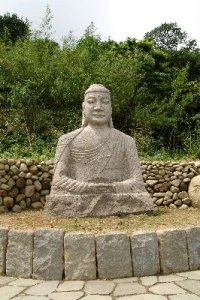Wrap yourself in awareness; continuously and perseveringly ask, “What is wu?” Venerable Guo Xing Fashi’s opening remarks go on….

An excruciating leg pain triggers a stomach ache, and my whole body feels hot then cold. My stomach ache lingers after time is up, and I finally am able to unwrap my legs. Drowsiness and wandering thoughts compete with the tremendous pain I am feeling.
Venerable Guo Xing Fashi shares the experiment he conducted just a moment ago. Indeed, by simply asking, “What is wu?” one can find out what is aware of the pain. There is no need to pay attention to the leg pain for pain is the mind. Because we grasp this body being I, anything else being external to I, the totality (inherent tranquil awareness) is divided into I, you and phenomena. In other words, because the mind moves, one feels leg pain. There is no need to grasp the feeling of like and reject the feeling of dislike. Vexation is Bodhi! Simply ask, “What is wu?” and the attention grabbing feeling of leg pain shall cease. Cut off the reciprocal circle of birth and death!
The feeling of pain vibrating through my leg arises again. Fashi’s experiment comes to rescue. What is wu? The awareness gradually becomes clear. It is so quiet… where is the pain now? Is the leg pain still there? Ouch! Ouch! What is wu? Don’t let go of the awareness. What is wu? Fashi is right; the feeling of leg pain is neither good nor bad! There is no need to be attached to it. But, what is aware of the pain? What is wu? I may not be able to endure the leg pain and had better unwrap them now.
There is no need to reject drowsiness or wandering thoughts. Fashi reminds us… the moment we become aware of those thoughts, they are gone. All phenomena are created by the mind. Wandering thoughts are images created by the mind. They are not external phenomena. All sensations are created by the mind and are functions of the mind; however, they are not the mind itself.
Fashi says that the act of eating is the previous thought consuming the later thought. It is the mind eating the mind. I bite a piece of vegetable. Who is biting? What is wu? Gradually, the awareness becomes more and more clear, and I vaguely remember the process of eating. The bowl is empty. Someone mops the table. What is wu?
It is already the evening of the ninth day into the retreat. Leg pain, drowsiness and wandering thoughts are still the picture of the mind. A thought comes into this picture. Over the years, I have been indulging in the feeling of joy for the goal of meditation, but have overlooked earnestly practicing the method of “What is wu?” Suddenly, a sense of humiliation arises. Why do I meditate? To find out where I go after death? Who is walking, talking, angry, laughing, eating,…? What is this perfect mind without any flaw? What is wu? Nothing else matters any more. Leg pain gradually creeps into the picture. What is wu? Leg pain is no longer a problem, drowsiness dissipates, strands of wandering thoughts shorten, and then stop. What is wu? What is this perfect mind without any flaw?
In daily life, whenever we focus on something, simply ask, “What is wu?” The awareness shall become clear. Fashi’s closing remarks go on. We should expand the Ch’an Hall to include the environment we live in, wrap ourselves in awareness; continuously and perseveringly ask, “What is wu?”
(shared by Jen-ni Kuo)